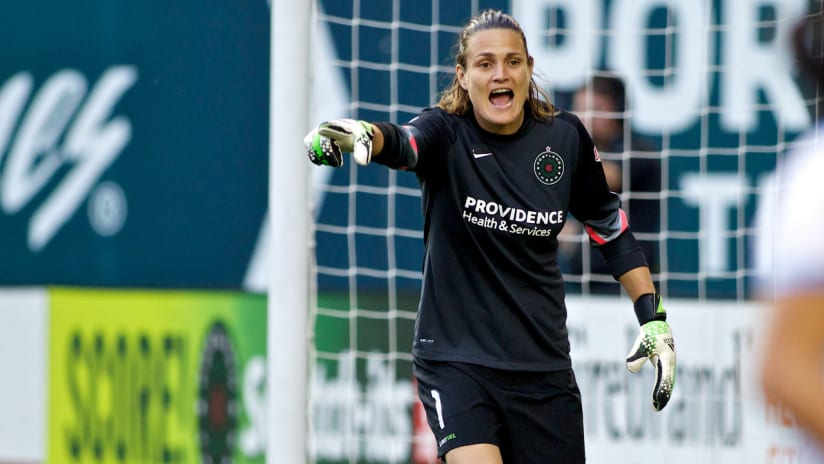PORTLAND, Ore. – As excited as Portland Thorns FC goalkeeper Nadine Angerer is to play in her fourth World Cup in Canada this summer, she's also thrilled to be back in Portland and training with the Thorns ahead of Saturday's NWSL season opener against the Boston Breakers (7pm PT, TICKETS, WEBSTREAM).
"I like to play for this club," she said. "I just want to play here. I like the city. I like the people."
Angerer first came to play for the Thorns last season, but the German international is no stranger to Portland.
During the 2003 FIFA Women’s World Cup, Angerer came to Portland as a goalkeeper on the German team that defeated the United States 3-0, in the semifinals at then-PGE Park. Though she was only in the city for a short time, the Rose City left quite an impression on her even then.
"You just have a feeling about a place," she said. "I was like, 'Portland was cool.' But I couldn't say why. I just had a feeling it's cool."
But after moving here ahead of the 2014 season, Angerer started to understand what it is about the city that she loves so much.
"It's the people,” Angerer said. “I like that they're so open. I like the buildings. I like the bridges, the stadium, the fans, everything. Seriously, I can't complain about anything.
"I was like, 'What is this here? It's so friendly.' If you meet people, it's not everything about soccer. They ask: 'What are you doing? What do you like? What can I recommend you?' I just like to sit in a cafe and look at the people because they're so open-minded and positive."
After thinking about it, though, she realized what exactly it is that keeps drawing her back to Portland.
"It reminds me of Berlin," she said. "It's alternative, open-minded, and this is what I really like."
This year is an important one for the veteran goalkeeper.
On June 7, the German National Team will kick off its 2015 FIFA Women's World Cup campaign against the Ivory Coast in Ottawa, Canada and hopes are high for a young German team. Angerer, however, admits that there's still work to do ahead of that game.
"On the German National Team we all have a good team spirit and we have a lot of abilities in our team. You know, we have a very, very young team so we have our ups and downs, so I hope we have a little consistency in our games. But I think we're on a very good way."
Angerer knows what she's talking about, having been to the past three World Cups (2003, 2007, and 2011). She played a crucial role in Germany's 2007 World Cup victory as she did not concede a goal during the tournament and set the record for most consecutive minutes played without conceding a goal at 540 minutes.
Still, regardless of how her nation performs this summer, Angerer acknowledges that the World Cup is a massive opportunity to grow the women's game.
"We know we're standing in focus at least for weeks," she said. "It's very important, especially that young kids have good role models—it doesn't matter from which country—that perform well and just model the way for young girls to play soccer."
More than many players, Angerer understands just how quickly things can change in women's soccer. She remembers how different the quality of play was when she first started playing and how few countries really took the sport seriously.
"I played the World Cup final in 2003 and I thought, 'Oh my God! It was such a fast and amazing game.' And then four years later, I played the World Cup 2007 and it was like, 'Oh my God, it's so much faster!' And that was already eight years ago, so you can see it's such a development from year to year.
"It's little things that can make a difference in a game," she continued. "Now you have at least five to eight countries that can win the World Cup."












